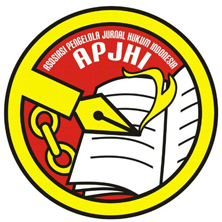Kebijakan Hukum Pidana Dalam Upaya Penanggulangan Tindak Pidana Korupsi Dipemerintahan Daerah Sorong Selatan
DOI:
https://doi.org/10.33506/jlj.v1i1.2484Keywords:
Criminal Law Policy; Gratification; Reverse Evidence System.Abstract
The purpose of this study is to find out the real politics of criminal law behind which the provisions for a reverse proof system are included in handling graphical corruption crimes, how law enforcement practices regarding handling corruption crimes through a system of implementing reverse proof, and how to set up a reverse proof system that can support effectiveness. eradication of corruption in the future. This type of research is. using an empirical or sociological juridical approach. In the sociological juridical approach, law as law in action is described as an emperate social symptom. The results of the research conclude first, that the political background of criminal law includes provisions for a reversing evidentiary system in handling graft corruption crimes initially due to law enforcement problems in graft corruption cases. One of the efforts to overcome these difficulties is to reformulate the fulfillment of the burden of proof in the judicial process carried out by law enforcement officials, namely by introducing a reverse burden of proof system. Second, the practice of law enforcement regarding the handling of criminal acts of corruption through an empirical application of reverse proof often faces many obstacles, especially in terms of the substance of the meaning of gratuities, reporting of gratuities to the Corruption Eradication Commission, criminal sanctions, and the qualifications of the giver and recipient of gratuities, so that optimizing the application and enforcement of law with the objectives to be achieved, namely certainty and justice.Downloads
Published
06-08-2023
How to Cite
Parura, Ronald Imanuel, and Arie Purnomo. 2023. “Kebijakan Hukum Pidana Dalam Upaya Penanggulangan Tindak Pidana Korupsi Dipemerintahan Daerah Sorong Selatan”. Journal of Law Justice (JLJ) 1 (1):28-40. https://doi.org/10.33506/jlj.v1i1.2484.
Issue
Section
Articles








